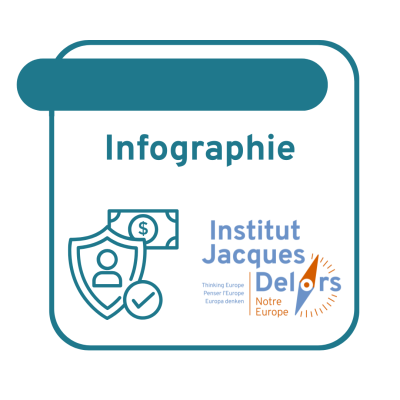Une concurrence libre mais trop faussée
Infolettre janvier 2023

Il y a bientôt un an, la guerre en Ukraine a bouleversé ce pays et, avec lui, l’Europe entière. En 2023, ce conflit à nos portes et toutes ses conséquences continueront de façonner l’agenda européen. Le prochain hiver, sans gaz russe aucun, se prépare dès maintenant. Les effets inflationnistes du surcoût de l’énergie sont à juguler. Programmés à cette fin, les sérieux tours de vis successifs des taux d’intérêt annoncés par la Banque centrale européenne exigeront de revoir l’articulation de la politique monétaire avec les politiques budgétaires.
Celles-ci sont à débattre au regard d’une autre secousse appréhendée dans l’Union européenne au début de la nouvelle année : le risque d’une fragmentation du marché intérieur. Ce qu’on appelait au départ le « Marché Commun » a toujours été au cœur de la construction européenne. Il est le cadre de la politique de concurrence et des aides d’Etat. L’étendue de son accès commande notre politique commerciale. Au moment où l’intégration de ce marché, qu’impulsa Jacques Delors pour en faire aujourd’hui le plus profond au monde, marque ses 30 ans, des forces internes et externes le tiraillent.
A l’extérieur, les subsides américains prévus par l’Inflation Reduction Act (IRA), qui font fi des règles de l’Organisation mondiale du commerce, aiguillonnent les choix d’investissements industriels au risque de délaisser le marché européen. Le découplage technologique qu’opèrent les Etats-Unis dans leur rivalité avec la Chine et le besoin de sortir de nos dépendances économiques envers Pékin (comme actuellement sur le paracétamol) obligent les entreprises européennes à réordonner leurs chaines de valeur et d’assortir le marché intérieur d’une politique industrielle. Les Projets importants d’intérêt européen commun (IPCEI, en anglais) sont un instrument prometteur pour se doter de moyens de fabriquer nos batteries pour véhicules électriques, nos semi-conducteurs de pointe et autres produits d’avenir.
A l’intérieur de l’Union, entre les Vingt-Sept, chaque gouvernement observe comment les autres soutiennent leur propre économie, à l’instar du soutien domestique allemand de 200 milliards d’euros pour ses ménages et entreprises en réponse à la crise énergétique. Des distorsions de concurrence sont redoutées entre les Etats capables de voler au secours de leurs industries et ceux dont les finances publiques n’autorisent pas de telles largesses. Garantir un cadre équitable de concurrence tant entre acteurs du marché européen qu’entre ce marché intégré et le reste du monde est le double défi économique sur lequel s’ouvre 2023. Il devra être au centre de l’attention de la présidence suédoise du Conseil de l’UE attachée à la compétitivité européenne. La Commission proposera un train de mesures en vue du Conseil européen des 9 et 10 février prochains, avec la riposte européenne à l’IRA à l’ordre du jour pour prévenir une guerre froide commerciale entre Alliés.
Sur cette question pressante, le franco-allemand entend retrouver son rôle moteur ensablé l’an dernier. En amont du sommet des Vingt-Sept, un conseil des ministres bilatéral fixé au 22 janvier, pour le 60e anniversaire du traité de l’Elysée, entend lancer le mouvement en faveur d’une plus grande flexibilité des aides publiques, l’accès aux Etats à de nouveaux prêts garantis (sur l’exemple du programme SURE pendant le Covid) et l’appui à des initiatives industrielles communes. Bref, un soutien européen en miroir à celui des Etats-Unis.
Ces discussions géoéconomiques sont inséparables de celles à venir sur les marges d’investissement des Etats, sur leurs capacités d’endettement et celle désormais soutenable par l’UE en tant que telle. La gouvernance économique est l’autre chantier européen qu’ouvre ce premier semestre 2023. Les récentes idées communiquées par la Commission pour faire évoluer le Pacte de stabilité et de croissance servent de base stimulante à la discussion. Face aux colossaux et collectifs besoins d’investissements pour accomplir, et accompagner socialement, les transitions énergétique et numérique, pour assurer notre défense et pour répondre aux défis sanitaires et du vieillissement démographique, l’Europe est en quête d’argent frais, public (endettement) et privé (union des marchés de capitaux).
Autant de sujets que notre think tank analysera dans leurs dimensions budgétaire, commerciale, géopolitique, sociale. Il en va de la crédibilité européenne à anticiper, réguler et riposter dans un monde de rapports de force décomplexés. Le scandale de corruption du ‘Qatargate’ qui se poursuit a entaché cette crédibilité, creusant la défiance envers la démocratie représentative en particulier et envers les institutions européennes en général. Rétablir la confiance citoyenne, autre défi plus que jamais à relever, se fera aussi dans la preuve politique que l’Europe peut changer la donne, comme dans sa réponse au Covid. De l’ampleur de notre aide continue à l’Ukraine à la fabrique de batteries électriques, de la production d’énergie aux chaînes d’approvisionnement et du filtrage des investissements étrangers à la production de médicaments et de semi-conducteurs, donner corps au concept de souveraineté européenne est devenu une bataille de tous les fronts et de chaque jour. En avant en 2023 !




